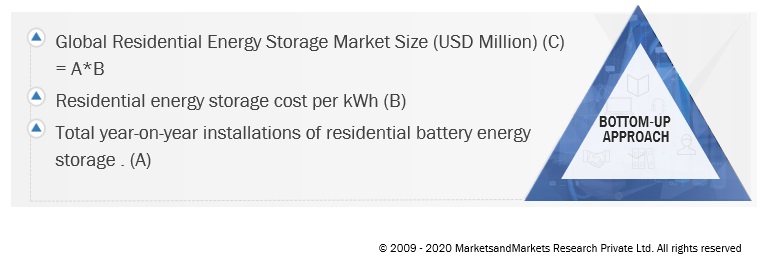The residential energy storage business is a subset of the energy storage sector dedicated to delivering energy storage solutions exclusively for residential residences. These systems often use batteries to store energy generated by renewable sources such as solar panels or wind turbines, or from the grid during off-peak hours when electricity rates are cheaper.
The growing production of electric vehicles and the rising demand for solar PV systems are expected to be the main drivers of this growth. These factors are expected to act as key catalysts for market expansion, with a compounded annual growth rate (CAGR) of 18.3% throughout the forecast period.The domestic energy storage market is dominated by a select number of large companies with extensive regional reach. The primary competitors in the residence energy storage market are Tesla (US), Panasonic Holdings Corporation (Japan), BYD Company Ltd. (China), LG Energy Solution (South Korea), and Enphase Energy (US).
According to a latest research, ‘The global residential energy storage market is estimated to be valued at USD 898 million in 2023 (Estimate Year) and is projected to reach USD 2,081 million by 2028 (Forecast Year) growing at a CAGR of 18.3% during the forecast period.’
Download PDF Brochure: https://www.marketsandmarkets.com/pdfdownloadNew.asp?id=153284325
Global Residential Energy Storage Market Size: Bottom-Up Approach

Market Definition
The residential energy storage market includes the purchase, sale, and deployment of energy storage systems designed for use in homes. These systems often include the installation of batteries or other storage technologies to store excess energy generated by renewable sources such as solar panels, or to store electricity from the grid during off-peak hours for future consumption. This market responds to homeowners’ increasing demand for energy independence, financial savings, and environmental sustainability.
Key Stakeholders
- Residental energy storage Manufacturers
- Suppliers and Distributors
- Installers and Service Providers
- Homeowners
- Utilities and Grid Operators
- Regulatory Bodies and Government Agencies
- Research Institutions and Industry Associations
- Energy Management System Providers
- Environmental and Renewable Energy Advocacy Groups
The Asia Pacific region is experiencing faster growth in the home energy storage industry than other regions. Several causes contribute to its expansion, including:
Rising Energy Demand: As the Asia Pacific area experiences fast urbanization and economic development, energy demand is increasing. Residential energy storage devices can help manage this demand more efficiently by storing extra energy for later consumption, lowering strain on the grid during peak hours.
Government Support and Incentives: Many Asia Pacific countries have developed policies and incentives to encourage renewable energy adoption and energy storage development. Subsidies, tax breaks, and advantageous laws have all prompted homeowners to invest in residential energy storage systems.
Declining Costs: The cost of energy storage technology, notably lithium-ion batteries, has been rapidly reducing. This development has made household energy storage systems more inexpensive and appealing to homeowners throughout Asia Pacific.
Request Sample Pages: https://www.marketsandmarkets.com/requestsampleNew.asp?id=153284325
Key Market Players
Tesla (US), VARTA AG (Germany), Enphase Energy (US), BYD Company Ltd. (China), Sonnen GmbH (Germany), and LG Energy Solution (South Korea) are a few of the major players. The market’s top players are using a variety of tactics to gain market share for residential energy storage.

